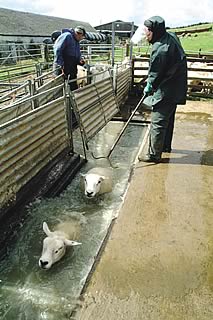 |
|||||||||
|
|||||||||||||||||||
|
|
Quarantine
and Accurate Diagnosis Essential for War on Sheep Scab 21/06/07 Making sure all incoming sheep are quarantined for at least three weeks and securing an accurate diagnosis of any ectoparasite problems are absolutely crucial if the industry is to maintain any momentum in its campaign to eradicate sheep scab.
Independent sheep consultant Lesley Stubbings stresses that flocks are at their most vulnerable to sheep scab - and many other diseases - when they bring sheep into the flock. She is urging sheep farmers to minimise these risks by sticking to a strict quarantine period, as recommended by SCOPS. “Every sheep coming onto the farm is a real threat and must be tackled responsibly - a minimum quarantine period of three to four weeks is essential. During this time they should be treated with both a levamisole (yellow) and macro-cyclic lactone (clear) wormer to remove any resistant worms and, ideally, also treated against scab. Remember, though, that if you are planning to use an OP dip, dipping must take place more than 14 days after drenching,” she points out. Lesley Stubbings also says that producers need to work closely with their vet to secure an accurate diagnosis of ectoparasite problems within the flock. “It is vital that we use the control options available to us (OP dip, the injectables and pour-ons) very carefully. It’s no good using an injectable just because you think you have a scab problem. If the problem is not scab - and is lice, for example - the injectable will be ineffective and you will simply have hastened the day when intestinal worms become resistant to these products.” For effective scab control, independent sheep vet Chris Lewis recommends a move back to OPs, particularly now that the introduction of genuinely closed-transfer systems - such as the water-soluble sachet-based approach favoured by Coopers Ectoforce - means dippers can no longer come into direct contact with the diazinon concentrate. Indeed, since the advent of these systems, there have been no further human adverse reaction reports to the VMD, he points out. “Used responsibly, plunge dipping with an OP is the gold standard sheep ectoparasite control system, with no recorded resistance. If you use an OP correctly you can be confident you will get rid of scab and protect your sheep against further infestation for up to 4 weeks. OPs are also fully effective against lice and keds too, and have a short withdrawal period at only 35 days,” he explains. “The mites are found in the groin, around the tail head, in the fissure near the eye, and in the ears. Then, when the temperature falls, the mites migrate back onto the body to produce clinical scab. As scab is highly contagious, these sheep then become a source of infection for the whole flock. And it is often these sheep that are the most common cause of new scab outbreaks in apparently isolated flocks,” he explains.
|
||||||||||||||||||

|
|
||||||||||||||||||
| home | agri-services | pedigree
pen | news | dairy | beef | machinery property | organisations | site map |
|||||||||||||||||||
